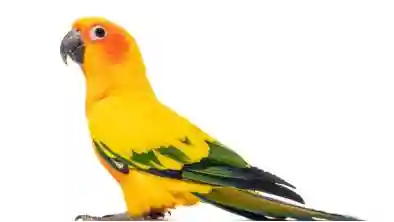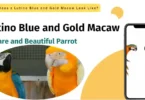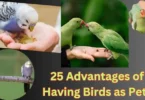In the enchanting world of avian wonders, the Sun Conure (Aratinga solstitialis) stands out as a true gem. With its vibrant plumage, charming personality, and intriguing behaviors, this parrot species has captured the hearts of bird enthusiasts worldwide. In this comprehensive guide, we delve deep into the world of Sun Conures, exploring their habitat, characteristics, care requirements, and much more.
Sun Conure Habitat
Native Range: Sun Conures are native to the northeastern regions of South America, primarily found in countries such as Brazil, Guyana, Suriname, and French Guiana. Their natural habitat encompasses tropical rainforests and coastal areas, where they thrive in the lush canopies and dense vegetation.
Habitat Characteristics: Within their native habitat, Sun Conures are often spotted in the treetops, where they make use of their strong beaks to forage for food and carve out nesting sites. The dense foliage provides them with both shelter and camouflage, allowing these vibrant birds to blend into their surroundings while avoiding predators.
Physical Characteristics
Plumage: One of the most striking features of Sun Conures is their resplendent plumage. Their body is predominantly covered in bright, sun-like yellow feathers, which gracefully contrast with their striking green wings and tail. The vivid orange plumage around their cheeks and the base of their beak adds an exquisite touch to their appearance.
Size: Sun Conures are small to medium-sized parrots, typically measuring between 11 to 12 inches (28 to 30 centimeters) in length. Their compact size makes them an ideal choice for bird enthusiasts who are looking for a pet that’s manageable yet visually captivating.
Behavior and Temperament
Social Creatures: Sun Conures are renowned for their sociable nature. They thrive on interaction and enjoy the company of both their fellow conures and their human caregivers. These birds are known for forming strong bonds with their owners, often displaying affection through cuddles and gentle nibbling.
Vocalization: Another notable aspect of Sun Conure’s behavior is its vocal prowess. These birds are excellent mimics and can mimic a variety of sounds, from household noises to tunes and phrases. While their chatter can be charming, it’s essential to note that they can be pretty loud, making them unsuitable for noise-sensitive environments.
Diet and Nutrition
Natural Diet: In the wild, Sun Conures feed on a diverse diet that includes fruits, nuts, seeds, and the occasional insect. Their keen beaks help them crack open nuts and extract seeds, making them resourceful foragers.
Captive Diet: For Sun Conures in captivity, it’s vital to replicate their natural diet as closely as possible. This means providing a balanced diet of high-quality parrot pellets, fresh fruits, and vegetables. A variety of foods ensures they receive the essential nutrients needed for their overall health.
Care Requirements

Housing: When keeping a Sun Conure as a pet, it’s vital to provide a spacious cage equipped with toys, perches, and ample room for them to spread their wings. These active birds need room to move and explore.
Mental Stimulation
Sun Conures are highly intelligent and require mental stimulation to prevent boredom. Interactive toys, puzzles, and social interaction with their owners are essential for their well-being.
Sun Conure Grooming
Regular grooming is essential to maintain the health and appearance of Sun Conures. This includes nail trimming and occasional feather clipping, which should be done by a trained professional to prevent injury.
Grooming a Sun-Conure is an essential part of their care routine to maintain their overall health and well-being. Here are some key aspects of Sun Conure grooming:
1. Feather Care – Bathing: Sun-Conures enjoy bathing and should be provided with the opportunity to do so regularly. You can offer a shallow dish of clean, lukewarm water or gently mist them with a spray bottle. This helps keep their feathers clean, removes dust, and promotes healthy plumage.
2. Nail Trimming: Sun Conure nails can grow too long and may become sharp, posing a risk to both the bird and its owners. Regular nail trimming is essential to prevent scratches and injuries. This should be done by a trained professional or a veterinarian to avoid accidentally cutting the quick nails.
3. Beak Maintenance: In their natural environment, Sun Conures use their beaks for various activities, which naturally helps keep them trimmed. In captivity, their beaks can become overgrown. To prevent this, provide appropriate chewing materials, such as bird-safe wooden toys and branches. If the beak becomes excessively overgrown, consult with an avian veterinarian for proper trimming.
4. Wing Clipping: Some Sun Conure owners choose to have their bird’s wings clipped to prevent flight. This can help prevent accidents and escapes. If you opt for wing clipping, it’s essential to have it done by an experienced professional to avoid harming the bird.
5. Feather Plucking: Keep an eye out for any signs of feather plucking, a behavior where the bird pulls out its feathers. Various factors, including stress, illness, or boredom, can cause feather plucking. Address the underlying cause and consult a veterinarian if necessary.
6. Oral Health: Sun Conures may develop beak and oral health issues. Ensure that their diet includes hard foods, like pellets and safe chewing materials, to help naturally wear down their beaks. Regular veterinary check-ups can help monitor their oral health.
7. Eye and Ear Cleaning: Occasionally, check their eyes and ears for any signs of discharge or debris. If you notice any abnormalities, consult with a veterinarian for proper care.
8. Skin and Feet Health: Inspect your Sun Conure’s skin and feet for any signs of irritation, dryness, or lesions. Ensure their perches are comfortable and of various textures to prevent foot issues.
Regular grooming and health checks are essential for your Sun Conure’s well-being. While some grooming tasks can be done at home, it’s crucial to seek professional assistance for nail trimming and beak maintenance to prevent injury. Additionally, if you notice any unusual behaviors or signs of illness during grooming, consult with an avian veterinarian for proper diagnosis and treatment.
Health and Common Issues

Signs of Good Health: A healthy Sun Conure exhibits bright, alert eyes, clean feathers, and a strong, active demeanor. Regular veterinary check-ups play a crucial role in promptly detecting and addressing potential health issues.
Common Health Concerns: Some common health issues that Sun Conures may face include respiratory problems, feather plucking due to stress, and beak overgrowth. Providing a balanced diet, a clean environment and regular vet visits can help prevent these issues.
Health and Wellness of your Sun Conure
Ensuring the health and wellness of your Sun Conure is vital for their overall quality of life. Here are key aspects to consider:
1. Diet and Nutrition: Provide a well-balanced diet consisting of high-quality commercial parrot pellets, fresh fruits, and vegetables. This ensures they receive essential vitamins and minerals. Avoid foods that are toxic to birds, such as chocolate, avocado, and caffeine.
2. Hydration: Ensure fresh, clean water is always available. Hydration is crucial for their health.
3. Regular Veterinary Check-ups: Schedule routine check-ups with an avian veterinarian. Regular exams can detect health issues early and help maintain your bird’s overall well-being.
4. Vaccinations and Preventative Care: Discuss vaccination options and preventative care with your veterinarian to protect your Sun Conure from common avian diseases.
5. Parasite Control: Monitor for signs of internal or external parasites, such as feather loss, weight loss, or changes in droppings. Consult your veterinarian for proper treatment.
6. Clean Environment: Keep their living area clean and hygienic to prevent the growth of harmful bacteria. Regularly remove droppings and uneaten food.
7. Mental Stimulation: Sun Conures are intelligent birds that need mental stimulation. Provide toys, puzzles, and activities that challenge their problem-solving skills.
8. Social Interaction: Sun Conures are social birds and thrive on interaction. Spend time with them daily to prevent loneliness and boredom.
9. Exercise: Encourage physical activity. Allow supervised out-of-cage playtime to promote exercise and mental well-being.
10. Stress Reduction: Minimize stressors in their environment. Avoid loud noises, sudden changes, or anything that might cause anxiety.
11. Sleep: Ensure they receive adequate sleep. Provide a quiet, dark, and comfortable sleeping area for 10-12 hours a night.
12. Observing Behavior: Be attentive to changes in behavior, appetite, droppings, or appearance. These can be indicators of underlying health issues.
13. Quarantine New Birds: If introducing a new bird into your home, quarantine it for a period to ensure it doesn’t introduce diseases to your existing bird.
14. Regular Grooming: Maintain grooming routines, such as feather care, nail trimming, and beak checks.
15. Emergencies: Have an emergency plan in place and know where to find an avian veterinarian in case of sudden health concerns.
By focusing on these aspects of health and wellness, you can provide your Sun Conure with a long, happy, and healthy life as a cherished member of your family.
Is Sun Conure a good pet?
Sun Conures can make wonderful pets for the right individuals or families. However, like any pet, they come with their own set of considerations and responsibilities. Here are some factors to keep in mind when considering a Sun Conure as a pet:
- Vibrant Personality: Sun Conures are known for their vibrant personalities. They are often described as playful, affectionate, and social birds. They enjoy interacting with their human caregivers and can form strong bonds.
- Beautiful Plumage: Their stunning, colorful plumage is a significant attraction. Their bright yellow, green, and orange feathers make them visually captivating.
- Long Lifespan: Sun Conures have a relatively long lifespan, often living for 15 to 20 years or even more with proper care. This is a long-term commitment that should not be taken lightly.
- Social Creatures: Sun Conures thrives on social interaction. They require daily attention, interaction, and mental stimulation. Neglecting their need for companionship can lead to behavioral issues.
- Loud Vocalization: These birds can be noisy. Their calls and screeches can be quite loud, which may not be suitable for people living in close quarters or noise-sensitive environments.
- Diet and Care: Sun Conures have specific dietary needs, requiring a balanced diet of pellets, fresh fruits, and vegetables. They also need a clean environment and regular grooming.
- Space Requirements: They need a spacious cage and time outside of it for exercise and mental stimulation.
- Potential Health Issues: Like all pets, Sun Conures can face health issues. Regular veterinary check-ups are essential to monitor their health.
- Training: Training is important for managing their behavior and ensuring they are well-behaved pets.
- Long-Term Commitment: As mentioned earlier, these birds have a long lifespan. Potential owners should be prepared for a long-term commitment in terms of care and companionship.
Sun Conures can be excellent pets for individuals or families who are willing to invest time, effort, and love into their care. They are known for their charming personalities and striking appearance. However, they are not a suitable choice for everyone, especially those who are not prepared for the responsibilities that come with owning a pet bird. Proper care and attention are essential to ensure that Sun Conures leads happy, healthy lives in captivity.
Can Sun Conure talk?
Sun Conures can mimic human speech and sounds, but their talking abilities can vary greatly from one bird to another. Here are some factors to consider when it comes to a Sun Conure’s ability to talk:
- Individual Variability: Just like humans, each Sun Conure is unique. Some may have a natural talent for mimicking sounds and words, while others may not be as proficient.
- Training and Socialization: The ability to talk can be influenced by the bird’s training and socialization. Birds that are exposed to a variety of sounds, words, and interactions from a young age are more likely to pick up and mimic speech.
- Repetition: Consistent repetition of words or phrases is often necessary for a Sun Conure to learn and mimic them. Patience and regular practice are key when trying to teach a Sun Conure to talk.
- Voice and Pronunciation: Keep in mind that a Sun Conure’s voice and pronunciation will differ from that of a human. Words and phrases may not be as clear or accurate as when spoken by a person.
- Age: Younger Sun Conures are often more receptive to learning new sounds and words. However, this doesn’t mean older birds can’t learn to talk; it might just take more time and patience.
- Personality: Some Sun Conures are more vocal and outgoing by nature, which can make them more likely to attempt speech. Others may be quieter and less inclined to mimic sounds.
- Positive Reinforcement: Reward-based training methods, where the bird is rewarded for mimicking words or sounds, can be effective in encouraging speech.
While some Sun Conures can develop a modest vocabulary and mimic sounds effectively, it’s important to remember that talking is not a guaranteed trait for all of them. Even if a Sun Conure doesn’t become a proficient talker, they can still be wonderful companions due to their engaging personalities and other charming traits.
Do Sun Conure bites hurt?
Sun Conures bites can indeed be painful. While Sun Conures are small to medium-sized parrots, they have sharp beaks designed for tasks like cracking nuts and chewing on branches. When they bite, their beaks can exert significant pressure, which can result in discomfort or pain for the person being bitten.
The severity of a Sun Conure’s bite can vary depending on several factors, including:
- Force: The strength of the bite can vary from bird to bird. Some Sun Conures may deliver a quick nip, while others may bite with more force.
- Mood and Temperament: The bird’s mood and temperament play a role. A frightened or agitated Sun Conure is more likely to bite in self-defense.
- Training and Socialization: Birds that are well-trained and properly socialized are generally less likely to bite. However, even well-socialized birds can bite if they feel threatened or provoked.
- Size and Age: Younger birds may not have as much strength in their beaks as older, fully matured ones.
- Intent: Sometimes, Sun Conures may bite as a way of communicating. They may be trying to get attention or express discomfort or displeasure.
It’s important to note that a bite from a Sun Conure is typically not meant to cause harm but is more often a form of communication or a reaction to a perceived threat. However, regardless of the bird’s intent, bites can still be painful and may lead to skin punctures or bruising.
To prevent bites and ensure a positive interaction with your Sun Conure, it’s essential to:
- Approach them calmly and slowly.
- Avoid sudden movements or loud noises.
- Pay attention to their body language to understand when they might be feeling stressed or uncomfortable.
- Provide proper socialization and training to build trust and reduce fear.
- Use positive reinforcement techniques to encourage desirable behaviors and discourage biting.
If you do get bitten, it’s essential to clean the wound promptly and seek medical attention if necessary, as bird bites can carry a risk of infection.
Are sun conures friendly birds?
Sun Conures are generally considered to be friendly and sociable birds. They are known for their engaging and affectionate personalities, which makes them popular choices as pets among bird enthusiasts. Here are some characteristics that contribute to their reputation as friendly birds:
- Social Nature: Sun Conures are highly social birds. They thrive on interaction and enjoy spending time with their human caregivers. Many Sun Conures form strong bonds with their owners and seek out companionship.
- Affectionate Behavior: These birds are often affectionate, displaying their fondness through cuddling, nuzzling, and gentle nibbling. They enjoy physical contact with their human companions.
- Playfulness: Sun Conures are playful by nature. They are known for their love of toys and games, and they often entertain themselves and their owners with their playful antics.
- Curious and Intelligent: Sun Conures are intelligent birds with a curious nature. They enjoy exploring their environment and engaging in mental stimulation activities, such as solving puzzles or learning tricks.
- Vocal Interaction: While their vocalizations can be loud, Sun Conures often use their voices to interact with their owners. They may mimic sounds and words, providing a form of communication and entertainment.
- Adaptability: With proper socialization and care, Sun Conures can adapt well to family life. They often become an integral part of the household, participating in daily activities and routines.
- Trust Building: Building trust is crucial when establishing a bond with a Sun Conure. Patience, positive reinforcement, and spending quality time with them can help build a strong and friendly relationship.
It’s important to note that individual personalities can vary among Sun Conures, just as they do among humans. Some may be more outgoing and friendly than others. Additionally, their behavior can be influenced by their upbringing and early socialization experiences.
Sun Conure lifespan
Sun Conures have a relatively long lifespan compared to many other pet birds. When well cared for, they can live for an average of 15 to 20 years, and in some cases, even longer. However, the lifespan of a Sun Conure can be influenced by various factors, including:
- Diet: Providing a balanced and nutritious diet is crucial for the long-term health of a Sun Conure. A proper diet can help prevent health issues that might otherwise shorten their lifespan.
- Environment: Creating a clean and safe environment for your Sun-Conure is essential. Avoid exposure to drafts, toxins, and other potential hazards that could affect their health.
- Healthcare: Regular veterinary check-ups are vital to detect and address any health issues early. Prompt medical attention can extend their lifespan.
- Socialization: Sun Conures are social birds. They thrive on interaction and companionship. Providing mental stimulation and socialization can contribute to their overall well-being.
- Genetics: The genetic background of a Sun-Conure can also play a role in its lifespan. Some birds may have genetic predispositions to certain health conditions.
- Exercise: Ensuring that your Sun Conure gets enough exercise and mental stimulation helps maintain their physical and mental health.
- Stress: Minimizing stressors in their environment and providing a stable and secure living situation can contribute to a longer life.
Lifespan of any pet can vary, and individual birds may have unique health and genetic factors that influence how long they live. To maximize the lifespan of your Sun Conure, provide them with a loving and attentive environment, proper nutrition, and regular veterinary care to ensure they lead a healthy and fulfilling life.
Sun Conure size
Sun Conures are small to medium-sized parrots, characterized by their vibrant and colorful plumage. Here are some specific details about their size:
Length: Sun Conures typically measure between 11 to 12 inches (28 to 30 centimeters) in length from the tip of their beaks to the ends of their tails.
Weight: They usually weigh between 100 to 130 grams (3.5 to 4.6 ounces), although individual variations can occur.
Despite their relatively compact size, Sun Conures are known for their energetic and lively personalities, making them delightful and engaging pets for bird enthusiasts.
Sun conure breeding age
Sun Conures typically reach sexual maturity and breeding age when they are around 2 to 3 years old. This can vary slightly depending on the individual bird and its overall health and development.
It’s essential to consider several factors before attempting to breed Sun-Conures. These include ensuring that both the male and female birds are in good health, providing them with an appropriate breeding environment and nesting materials, and understanding the responsibilities and potential challenges associated with breeding and caring for the chicks.
Breeding birds should be monitored closely, and if you’re new to breeding Sun Conures, it’s advisable to seek guidance from experienced aviculturists or veterinarians to ensure a safe and successful breeding process.
Sun Conure Housing and Cage Setup
Creating a suitable housing and cage setup for your Sun-Conure is crucial to ensure their well-being and happiness. Here are some guidelines to follow when setting up a Sun Conure’s living space:
1. Cage Size:
- Choose a cage that allows your Sun-Conure to stretch its wings and move comfortably. For a single Sun Conure, a cage with dimensions of at least 24 inches (61 centimeters) in width, 24 inches in depth, and 36 inches (91 centimeters) in height is a good starting point.
- If you plan to house multiple birds, ensure the cage is appropriately larger to accommodate their needs.
2. Bar Spacing:
- Opt for a cage with a bar spacing of about 1/2 inch (1.27 centimeters). This spacing prevents the bird from getting its head or body stuck between the bars.
3. Cage Material:
- Choose a cage made of safe, non-toxic materials, such as stainless steel or powder-coated metal. Avoid cages with zinc or lead, as these can be harmful to your bird.
4. Cage Placement:
- Place the cage in an area where your Sun-Conure can be part of the family environment. They are social birds and enjoy being around people.
- Avoid placing the cage in drafty areas or direct sunlight, which can cause temperature extremes.
5. Perches:
- Provide a variety of perch sizes and textures to help keep your Sun Conure’s feet healthy and engaged.
- Natural wood perches are excellent choices, as they mimic their natural environment. Ensure they are pesticide-free and clean.
6. Toys and Enrichment:
- Sun Conures are intelligent and need mental stimulation. Offer a variety of toys, such as puzzle toys, bells, and chewable items, to keep them mentally active.
- Rotate toys regularly to prevent boredom.
7. Feeding Stations:
- Set up separate stations for food and water. Provide stainless steel or ceramic dishes that are easy to clean.
- Ensure that fresh water is always available.
8. Cleaning and Hygiene:
- Establish a routine for cage cleaning to maintain a clean and healthy environment. Remove droppings, uneaten food, and replace soiled bedding regularly.
- Disinfect the cage periodically to prevent the buildup of harmful bacteria.
9. Hideaways and Nesting Areas:
- Provide hiding spots or nesting boxes, especially if you plan to breed Sun Conures. These should be placed in a way that allows your bird to feel secure.
10. Safety Measures:
- Ensure that doors and latches are secure to prevent escapes.
- Remove or secure any potential hazards in the cage, such as small parts or exposed wires.
By setting up a comfortable, safe, and engaging living space for your Sun-Conure, you can help ensure their happiness and well-being. Regular interaction, a balanced diet, and proper care are also essential components of keeping your Sun-Conure healthy and content.
Activity Level of Sun Conures
Sun Conures are known for their high activity levels and playful nature. They are vibrant and energetic birds that require mental and physical stimulation to stay happy and healthy. Here are some insights into the typical activity level of Sun-Conures:
1. Playfulness: Sun Conures are naturally playful birds. They enjoy a wide range of toys and activities, such as climbing, swinging, shredding paper, and chewing on toys. Providing them with a variety of toys and playtime opportunities is essential to keep them engaged.
2. Social Interaction: These birds thrive on social interaction. They enjoy spending time with their human caregivers and other birds if they have avian companions. They will often seek attention, cuddles, and physical contact.
3. Vocalization: Sun Conures are known for their vocal nature. They can be quite chatty, with a wide repertoire of sounds, including squawks, chirps, and the potential to mimic words or phrases. Their vocalizations can be loud, especially when they’re excited or seeking attention.
4. Exercise Needs: Sun Conures require regular exercise to stay healthy. Providing a safe area outside of their cage for flying and stretching their wings is beneficial. Supervised out-of-cage playtime can also be a great way to satisfy their need for physical activity.
5. Mental Stimulation: These intelligent birds need mental stimulation to prevent boredom. Puzzle toys, foraging toys, and activities that challenge their problem-solving skills are essential for their mental well-being.
6. Daily Routine: Establishing a daily routine that includes playtime, interaction, and mental stimulation is important for Sun Conures. They thrive when they have a predictable schedule.
7. Social Bonding: Sun Conures often form strong bonds with their human caregivers. They may want to be near you, sit on your shoulder, or engage in grooming behaviors as a sign of affection.
8. Rest: While they are active birds, Sun Conures also need sufficient rest. Ensure they have a quiet and comfortable sleeping area where they can get their required hours of sleep, typically 10-12 hours per night.
Provide your Sun Conure with opportunities for both physical and mental activity to keep them happy and prevent behavioral issues that can arise from boredom or lack of stimulation. Regular social interaction and playtime with your bird are excellent ways to foster a strong bond and maintain their active and playful nature.
Conclusion
Sun Conure is a beautiful parrot species known for its vibrant plumage, charming personality, and remarkable intelligence. Whether you’re considering bringing one into your home or simply have a fascination with these avian wonders, understanding their habitat, characteristics, and care requirements is essential. By providing them with the appropriate care, attention, and love, you can enjoy the companionship of these radiant birds for many years to come.
Frequently Asked Questions (FAQs)
What is the average lifespan of a Sun Conure?
Sun Conures typically live for around 15 to 20 years or even longer with proper care.
Can Sun Conures talk?
Yes, Sun Conures have the capacity to mimic human speech and sounds, although their talking abilities can vary among individual birds.
How do I prevent feather plucking in my Sun Conure?
Preventing feather plucking involves addressing the underlying causes, such as stress or boredom. Ensure your bird has mental stimulation, a well-balanced diet, and a stress-free environment. If feather plucking persists, consult an avian veterinarian for guidance.
Disclosure
“As an Amazon Associate, we earn from qualifying purchases where there is no additional cost to you. This is one way to support us.”








